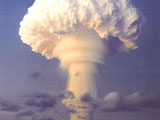Russian Nuke Plans, Overkill
By Simon Saradzhyan for ISN
The 2000 Military Doctrine asserts that Russia “reserves the right” to use nuclear weapons first “in response to large-scale aggression using conventional weapons in situations critical to the national security of the Russian Federation.”
The doctrine says nuclear weapons can be used in a regional war, which it describes as a war in which several regional states or a coalition of such states would be fighting against each other. This regional war may be the result of an escalation of a local war fought by warring states on each other’s territory, according to the doctrine.
However, while allowing use in a regional war, neither this nor any other current strategic Russian document explicitly allows for first use of nuclear weapons in a local war.
But Russia’s new military doctrine will do just that if President Dmitry Medvedev endorses the current draft, which is being put together by the presidential Security Council with input from the General Staff.
Changes in the new doctrine compared to the 2000 document include “adjustment of conditions for use of nuclear weapons when repelling an aggression with use of conventional means of destruction not only in a large-scale war, but also in a regional and even a local war,” according to Security Council Secretary Nikolai Patrushev.
The current draft of the new doctrine will also spell out the use of nuclear weapons “depending on intentions of the potential foe” as well as the possibility “of a preventive nuclear strike on the aggressor,” according to Patrushev’s external page 14 October interview with Russian national daily Izvestia.
Of all the planned innovations, the first use of nuclear weapons in a conventional local war is the most striking, especially when analyzed in the context of a post-Cold War shift in the hierarchy of real threats to Russia’s national security from a large-scale war with NATO to low-intensity conflict involving non-state actors.
It may be the case that the new defense doctrine will expand the first use of nuclear weapons in a local conventional war only if Russian conventional forces are overwhelmed by a superior foe.
In fact, the Russian military has already gamed out first use of nuclear weapons against NATO in a conventional conflict more than once. But such foes, including NATO, are already more than sufficiently deterred by the existing first use of policy “in response to large-scale aggression using conventional weapons in situations critical to the national security,” while other foes will not be deterred even by expanded use of nuclear weapons.
And the pledge to use nuclear weapons to defend itself and its allies failed to deter Russia’s foes in either of the real conflicts that post-Communist Russia’s armed forces have had to fight so far, including in two conflicts in Chechnya and the war in South Ossetia.
It might be this ‘liberalization’ of the use of nuclear weapons that a retired Russian general familiar with the ‘essence’ of the new doctrine had in mind when he was quoted in the 9 October issue of Nezavisimaya Gazeta as saying that “when the new doctrine is presented, it will give other states a reason to once again accuse Russia of being aggressive.”
The general said the new doctrine spells out numerous specific scenarios for the use of nuclear weapons, which he described as excessive. He said some of the planned doctrine’s provisions are inadmissible and argued that the new doctrine looks “external page detached from reality.”
The planned expansion of the use of nuclear weapons may, indeed, have little to do with these real threats, but will raise a lot of questions on how it conforms with Russia’s new Strategy of National Security Until Year 2020, which President Medvedev signed in May 2009 to introduce a commitment to Global Zero as well as with Russia’s international commitments on arms control, which will be examined at the Nuclear Non-Proliferation Treaty (NPT) Review Conference next year.
It is natural for organizations, including the armed forces, to pursue an expansion of their functions, but it is also the right and responsibility of the commander-in-chief to make sure that these functions are tailored to Russia’s real needs and conform with his political vision, including the national security strategy, which argues that “Russia’s sustainable long-term development” depends on progress “towards a world free of nuclear weapons, and the creation of conditions of equal security for all.”
